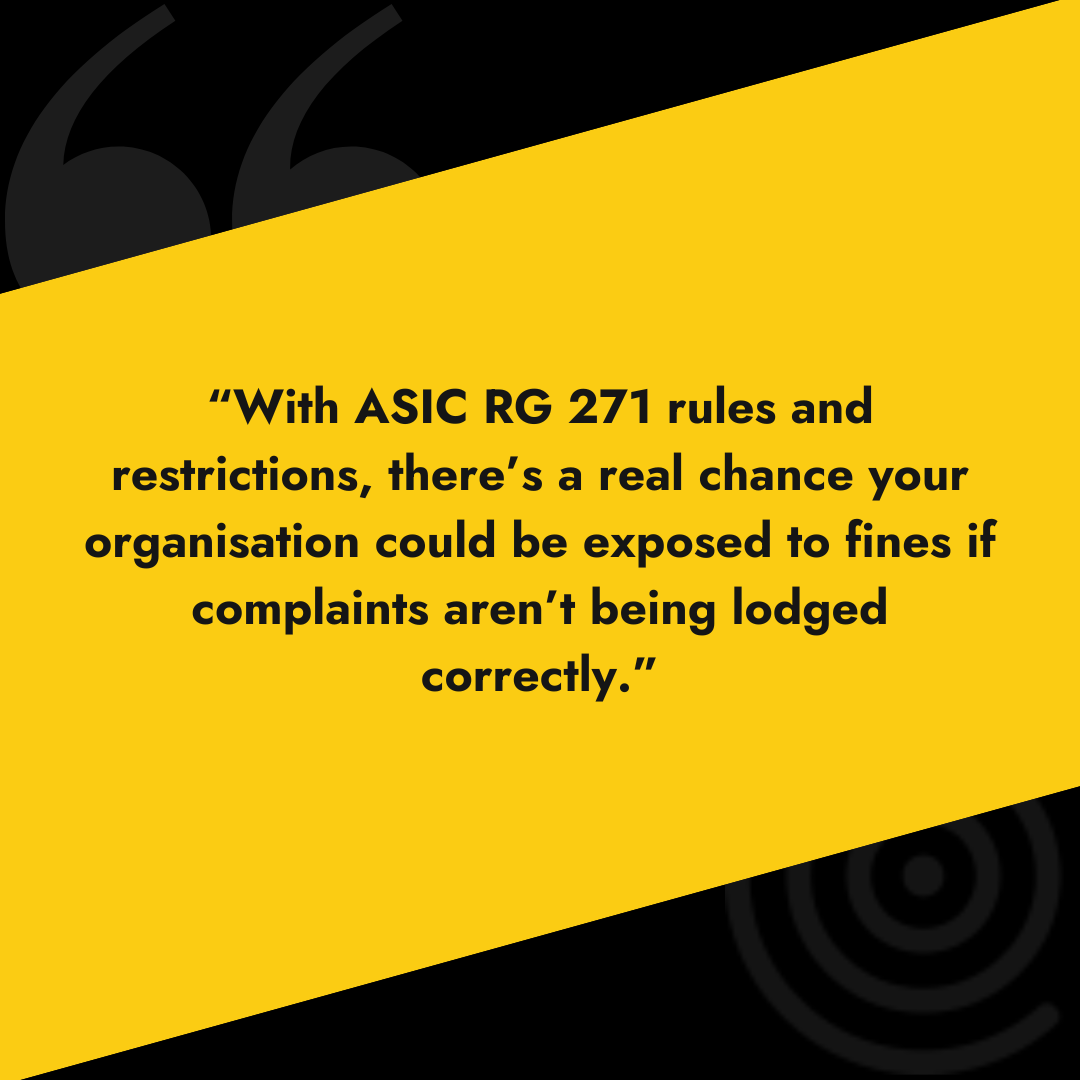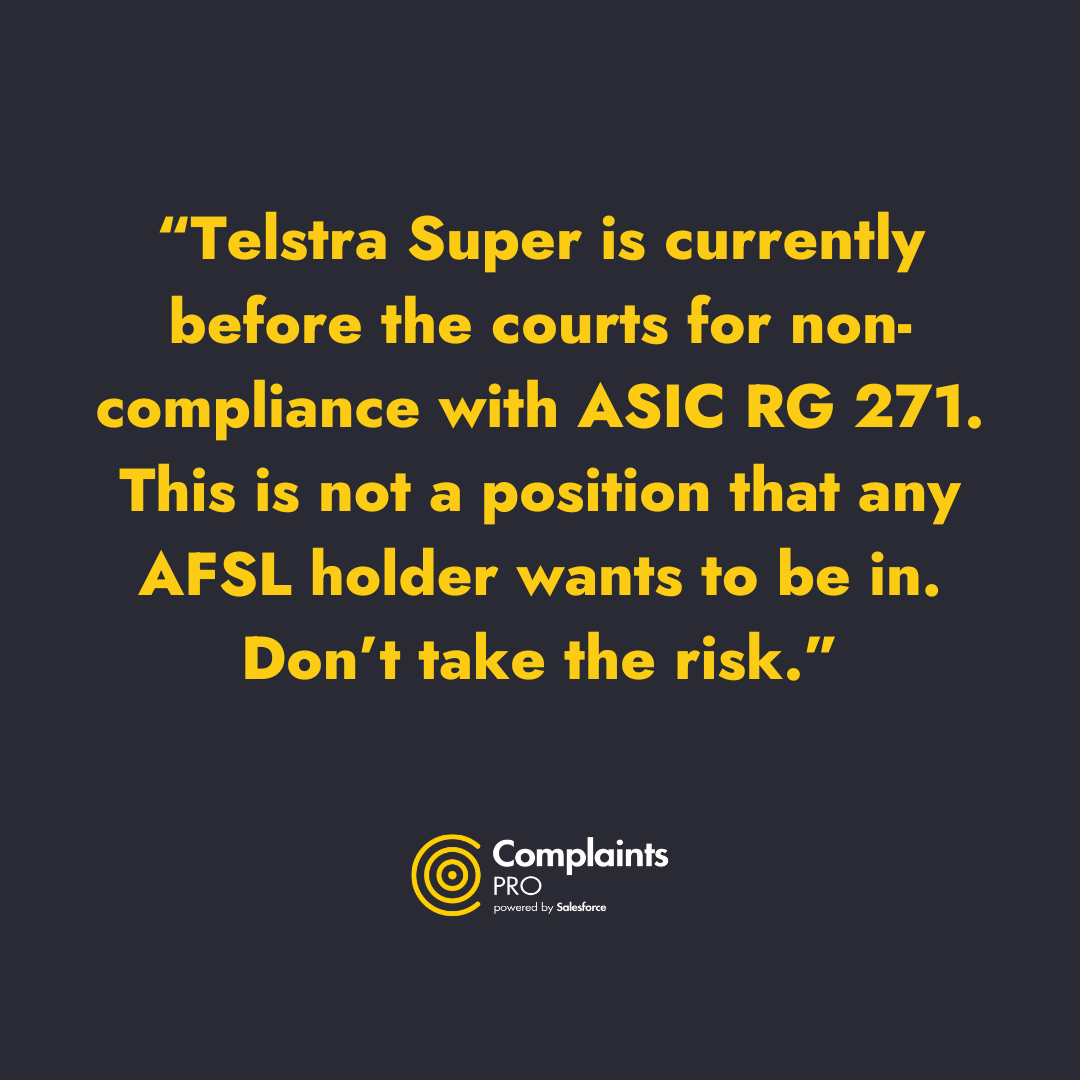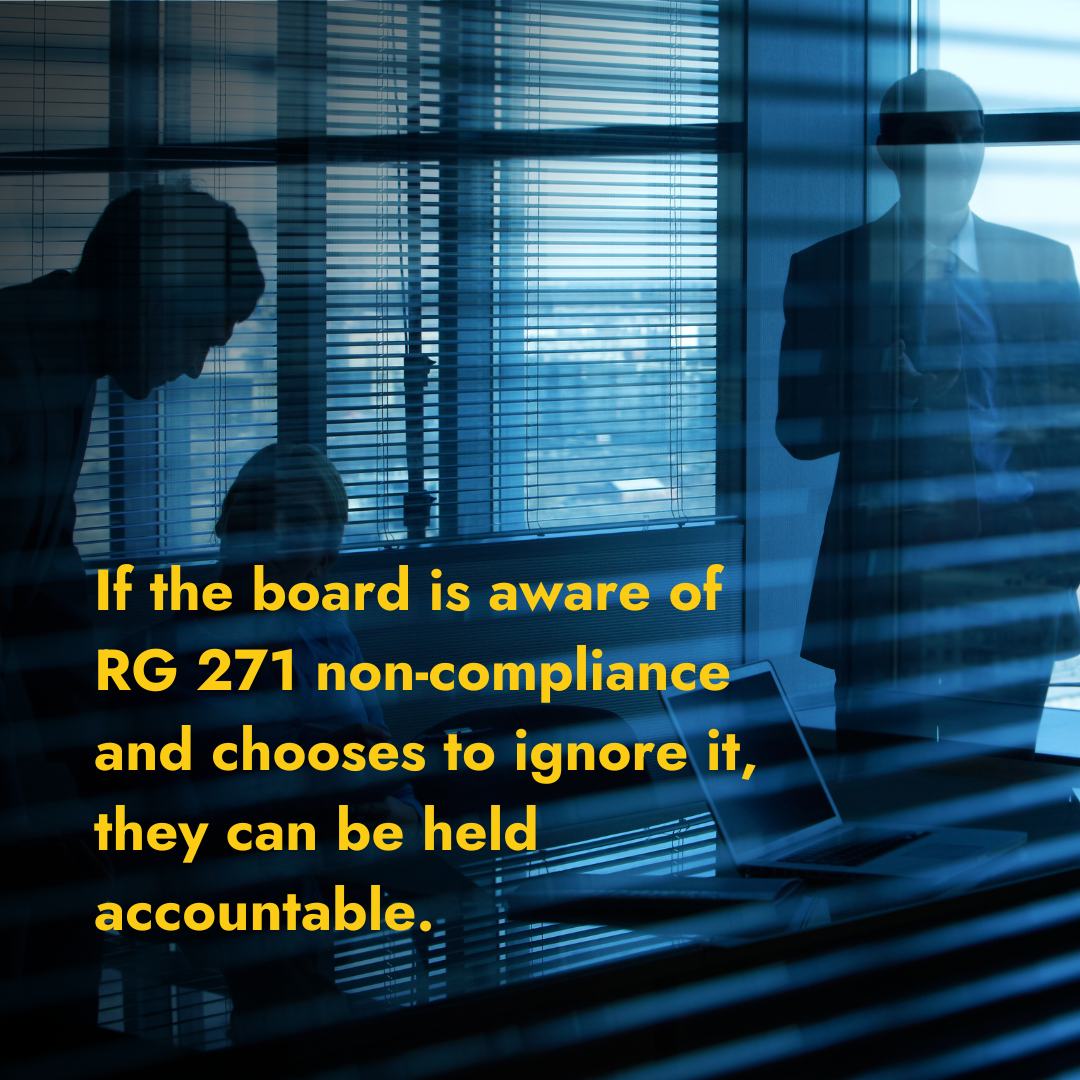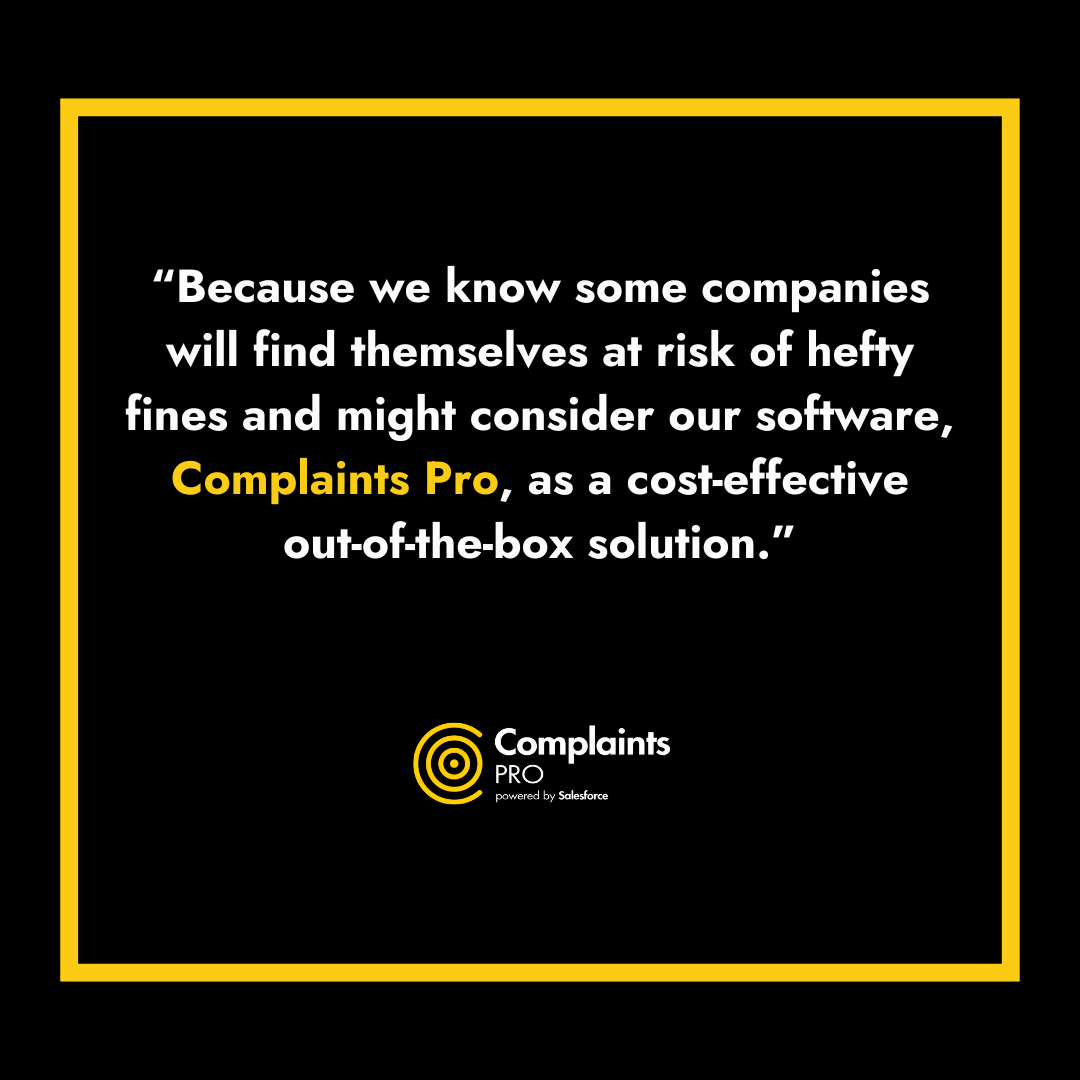
With ASIC RG 271 rules and restrictions, there’s a real chance your organisation could be exposed to fines if complaints aren’t being lodged correctly.
And … we’re seeing that a SIGNIFICANT portion of Financial Services companies are not meeting their legal obligations under these new ASIC RG 271 rules.
What’s more concerning is that Compliance Managers, Risk Executives, and Legal teams often don’t even realise the extent of their exposure to non-compliance with RG 271.
Many believe they’re doing everything right—that they’re fully compliant and not at risk.

But the reality is, the new RG 271 regulations are so complex and nuanced - it is easy to make an error.
The problem is, these mistakes result in non-compliance to enforceable RG 271 paragraphs - and non-compliance, means risk of ASIC audit and possibly fines.
Your organisation could be at serious risk if complaints aren’t being captured correctly. Don’t take that risk, by forcing your Compliance, Risk, and Complaints managers to tackle RG 271 on their own.
Example of a recent RG 271 lawsuit: Telstra Super is facing up to $11.1 million in fines…
Telstra Super is currently before the courts for non-compliance with ASIC RG 271.
The fine was issued after ASIC found several breaches.
Below are the 4 examples of Telstra Super’s breaches - can you relate to any of these?
- Inadequate IDR Response Composition: IDR Responses failed to inform complainants about their right to take their complaints to AFCA
- Failure to meet the 45-day timeframe: Responses were not sent to complainants within the applicable 45-day timeframe
- Inadequate IDR Delay Notification Composition: IDR Delay Notifications failed to inform complainants about why there was a delay in their response.
- Inadequately Resourced IDR Process: Telstra super failed to provide adequate staff resources to ensure compliance to ASIC RG 271
As if the possible $11.1 million in fines weren’t enough… The repercussions for Telstra Super continue.
The lawsuit means that Telstra Super’s name will forever be linked with an ASIC RG 271 audit fail - showing that they are not properly looking after their customers
This is not a position that any AFSL holder wants to be in. Don’t take the risk.

RISK AREA #1: Your frontline team isn’t capturing complaints data in a compliant way
OK, let’s take a look at one major risk area for RG 271 non-compliance.
In our work with financial services companies, we’ve found that MANY frontline teams aren’t lodging all complaints, specifically those closed on first point of contact, or within 5 business days.
Unfortunately, this is a clear breach of ASIC RG 271, specifically RG 271.179 - “Firms must record all complaints that they receive…”
You might be asking though, what is leading these frontline teams to make such a substantial error?
Often, it’s because of a cultural issue within organisations, where frontline staff won’t record complaints that are closed on first point of contact or within 5 business days, because the process to do so is too complex and arduous.
This is due to ineffective complaint capture tools, that don’t allow staff to quickly an easily capture complaints in accordance to ASIC RG 271.
Frontline staff often think, “It’s not my job to log this—it’s already resolved.” Historically, they’ve only lodged formal, serious complaints. But with RG 271, even the smallest complaints must now be lodged.
However, ASIC is clear about this.
Complaints previously handled informally—like over the phone—now need to be lodged and reported to ASIC.
If this isn’t happening, you’re at risk of non-compliance.
That’s the new reality.

RISK AREA #2: Your current system makes RG 271 compliance near-impossible
Chances are you have a Complaints Management system in place, or maybe even a spreadsheet. Possibly you’ve even attempted some CRM changes, complex data entry forms or patching your core systems in an attempt to be compliant.
But what we’ve seen in the industry is most Complaints Management systems are essentially a data entry system that burdens your frontline staff and your IDR/ EDR teams when it comes time to managing and reporting. The system is so cumbersome. As a result, they’re only logging the bigger, more serious complaints.
Your frontline staff are trained to handle calls quickly, and get off the phone. So how can you expect them to use a complex, time-consuming form?
They already don’t like using the form to log the big complaints. So asking them to log the simple complaints as well is a stretch. It’s overwhelming, full of “legalese,” and not designed for ease of use.
It’s no surprise—they’re not doing it.
And that’s your risk.

Don’t forget, by not capturing those complaints, your organisation is non-compliant to ASIC RG 271, specifically RG 271.179 - “Firms must record all complaints that they receive…”
Is your Complaints Management system actually built for RG 271 compliance?
The truth is, your current setup is probably not purpose-built to solve this problem.
RISK AREA #3: The board or executive team are not aware of the level of risk
We’ve heard this directly from compliance leaders in financial services companies when we’ve informed them about the risks:
“You know what, you’re right. We are not compliant to RG 271 and we’re at risk of large fines. I’m going to present this to the board, but they probably won’t listen.”
The board doesn’t listen because they aren’t aware of the level of risk and the fact that ASIC is already starting to
Here’s the reality:

Look at the Telstra Super case. They are at risk of being fined millions, and the board was ultimately responsible.
And this doesn’t just count for the board, we are seeing high level decision makers not taking ASIC RG 271 seriously.
Do your executives truly understand the risks they’re taking by not prioritising RG 271 compliance?
It’s not worth the risk
Working towards solutions: Understand your RG 271 risk exposure with Causia’s Free RG 271 Risk Assessment
After reading this far, are you sure you’re compliant to ASIC RG 271?
If not… Causia is offering a free RG 271 Risk Assessment for Australian Financial Services companies
This 30-page assessment will pinpoint exactly where you’re compliant to RG 271—and where you’re not.
The risk assessment is more than just a report. It’s an education tool.
It will not only make you fully aware of your compliance gaps, but it will also educate your managers and the board about the risks they’re carrying.
On top of that, it will provide you with helpful tips and tricks to identify possible risks such as underreporting in the future
Once you have that clarity, you can act from a position of knowledge and power.

The best part: It’s 100% free. Why are we offering this?
Because we know some companies will find themselves at risk of hefty fines and might consider our software, Complaints Pro, as a cost-effective out-of-the-box solution.
Instead of trying to patch together solutions, risking non-compliance and potential court action..
Why risk it when Complaints Pro is a pre-built, ground-up system designed to solve these problems?

Speak To An RG 271 Expert
In a quick conversation, we'll discuss your approach to managing RG 271, show you how that compares to other similar Financial Services companies, and demonstrate how Complaints Pro will streamline your processes.

